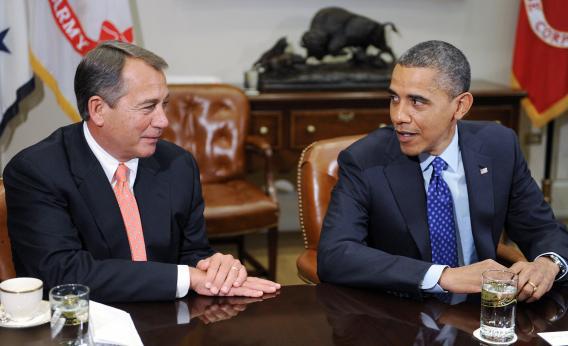Right now the House speaker and the president seem to be negotiating between a one-year increase in federal borrowing authority (Boehner) and a two-year increase (Obama) which is obviously not the kind of deep divide of principle that it’s impossible to find a compromise on. And that’s the problem.
Just last week, I was trying to convince people that the administration had a new spirit of resolve on the debt-ceiling question. Over the past year, I’ve repeatedly heard from administration officials both senior and junior that their on-the-record posture of no renewed negotiations on the debt ceiling is not a bluff. They’ve shown charts and graphs of how damaging they think the last standoff was to the economy, and made it a centerpiece of their story about why the recovery seemed to stall out for a while in 2011. Routinized hostage-taking was, they said, genuinely dangerous to the American economy.
But then it’s emerged this week that they didn’t really mean it. The debt ceiling is just another issue in the mix along with tax rates and benefit formulae and tax reform commissions and all the rest. One more pawn on the chessboard.
The problems with this are twofold. One is that their analysis about the danger of the debt ceiling is correct. Another is that by backing down after having invested time and energy in convincing people that they won’t back down, the administration is going to make it much harder for themselves to be credible the next time around. There are two reasonable ways to handle the debt ceiling. One is to achieve a permanent solution as part of the resolution of the fiscal cliff. The other is to completely ignore it in the resolution of the fiscal cliff, and then have the president wage and win a total victory on a separate debt ceiling battle. Delaying the debt ceiling crisis until some time in 2015 as part of a larger bargain merely institutionalizes the idea that the debt ceiling is a bargaining chip and entrenches the idea that the president will cave.
